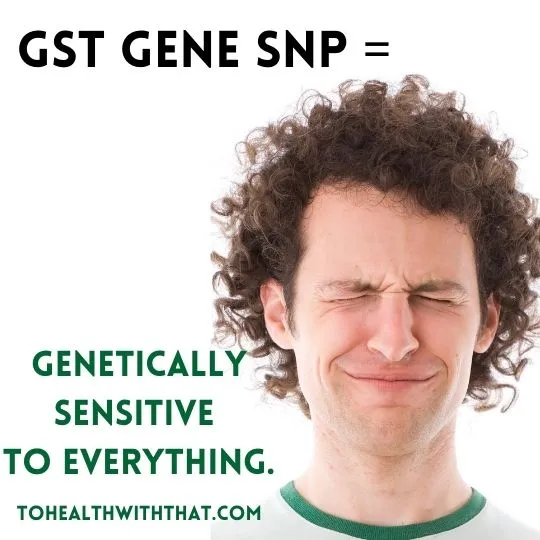Last week we reviewed glutathione and its absolutely crucial importance in the body. We also spoke about it in S1E14: MTHFR and Glutathione that details some of the symptoms and diseases linked to low glutathione status and goes over the basics about how MTHFR affects glutathione.
This week, let’s talk about the two most well documented gene SNPs that affect glutathione in particular detoxification pathways. Those are GST and GPX.
GST, Which I Like to Call “Genetically Sensitive To Everything”
GST stands for glutathione S-transferase, and there are a number of different GST genes including GSTA1, A4, M2, M3, O1, O2, and P1. Outside of the necessary genetic alphabet soup, all of these genes code for enzymes that attach glutathione to some kind of xenobiotic, which is a fancy word for a chemical that is foreign to your body.
The reason you need to attach a glutathione to foreign chemicals is so that your body can actually make them water soluble and eliminate them from your body. If the GST enzymes don’t work correctly then the chemicals build up quickly and start doing damage and nobody feels this damage more than folks with a GST polymorphism. This can include cigarette smoke, heavy metals, pesticides, herbicides, carcinogens, air pollutants, and pharmaceutical drugs.

Signs and Symptoms of a GST Polymorphism
- Hypersensitivity to chemicals – you know when there’s a scented candle in the house and if someone walks past with strong perfume, it’s game over.
- Fatigue – because let’s face it. You’re toxic.
- Brain fog – especially with chemical exposure but it can feel like it’s all the time.
- Increased inflammation – which can look like joint or tissue pain, headaches, or mood issues like anxiety or depression
- Cancer – higher than average amounts of cancer in your family tree or personal history of cancer.
- Asthma – several GST polymorphisms have a strong association with asthma, especially asthma triggered by air pollutants or particulates.
- Trouble with fertility – some GST mutations are linked to poor spermatogenesis in men and adverse pregnancy outcomes in women.
GST Does Have Some Superpowers
Thank god for small mercies. GST folks tend to have a higher than average response to chemotherapy, which is a blessing. This is essentially because the chemicals in the chemotherapy are also difficult to clear. Folks with this polymorphism also naturally tend to keep a more chemical-free home and have an innate ability to detect chemicals that other people might not notice and so can take proactive steps to keep them out of their lives.
GPX, or Glutathione Peroxidase
Just like the name suggests, glutathione peroxidase helps your body to eliminate peroxide.
You might be thinking, “But, Amy. I don’t drink a lot of peroxide.”
While I’m happy to hear that, but the sad truth is that your body makes its own peroxide in fairly large quantities. Hydrogen peroxide is a common metabolic by-product and is formed from normal activities of daily living and especially during stressful times.
Like with the GST polymorphism, there is a family of GPX mutations conveniently numbered from GPX-1 to GPX-7.

Signs and Symptoms of a GPX Polymorphism
- Prematurely grey hair – turns out that peroxide internally leeches the color out of your hair as well as it does from the surface.
- Increased inflammation – which can look like joint or tissue pain, headaches, or mood issues like anxiety, depression, irritability, or aggression.
- Cancer – higher than average amounts of cancer in your family tree or a personal history of cancer.
- Diabetes – several GPX polymorphisms have a strong association with diabetes, insulin resistance, high insulin, and obesity.
- Heart and cardiovascular issues – cardiomyopathy, troubles with peripheral circulation and vascular tone, atherosclerosis and signs of cardiac inflammation.
- Overweight – very easy to gain weight even with a healthy, normally-portioned diet. This especially coincides with the blood sugar troubles related to this gene SNP.
- Brain fog and memory problems – peroxide is especially damaging to your brain and neurological tissues.
How to Help When You Have A GST or GPX Mutation
There are some great ways to help your body compensate for a GST or GPX polymorphism. Here are some of the most important:
- Avoid Toxins – eliminate as many chemicals from your home and environment as you can. Get rid of the air fresheners, chemical cleaning products, plastics, pesticides and herbicides on your lawn and in your food. Invest in air and water filters.
- Don’t smoke (!!!) – this is absolutely crucial.
- Boost your glutathione – you can use some of the methods we’ve already talked about here and here.
- Take NAC – NAC is the direct precursor to glutathione and it’s best taken on an empty stomach. If you have a hard time tolerating this one, then look for a liposomal glutathione preparation.
- Make sure you get enough selenium – selenium is crucial to the formation of glutathione and selenium restriction makes the effects of both GPX and GST worse..
- Balance your methylation – we’ve talked about it before, but for glutathione to be produced, methylation needs to be functioning well. If you don’t know where to start with that, you can start here.
- Get your riboflavin (or vitamin B2) – riboflavin helps to recycle and regenerate your glutathione for optimal functioning. In great news, it’s also a cofactor for the methylation reactions, so this one is doing double duty.
- Avoid toxins – I know I mentioned it 20 seconds ago, but it’s the most important thing. Seriously avoid those toxins.
- Focus on a high fruit and veggie diet – getting lots of good antioxidants, vitamins, and minerals in your diet and helping your body to keep inflammation down is vital, and fruits and veggies are one of the best ways to do that. Just try to go organic whenever possible, especially if you’re buying something in the EWGs “dirty dozen” list.
There is an investigational drug called Ebselen that is an analog to the GPX enzyme and is being investigated for reperfusion injury, stroke, hearing loss, tinnitus, bipolar disorder, and Covid-19. It is not yet approved or clinically available, but may be some time in the future.
MTHFR is a common genetic mutation that can contribute to anxiety, depression, fatigue, chronic pain, infertility, and more serious conditions like breast implant illness, heart attack, stroke, chronic fatigue syndrome, and some types of cancer. If you know or suspect you have an MTHFR variant, schedule a free 15-minute meet-and-greet appointment with MTHFR expert Dr. Amy today.
Book Your Appointment
